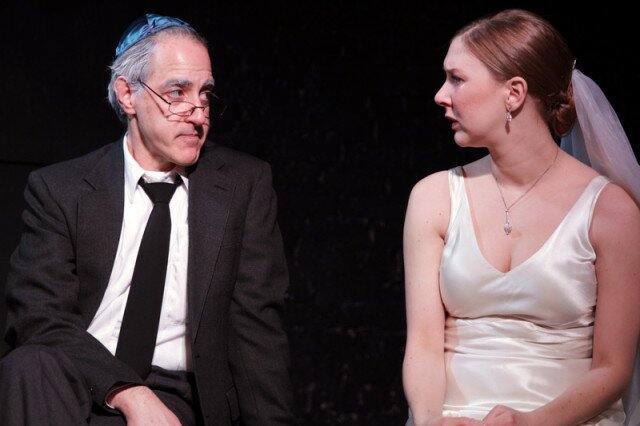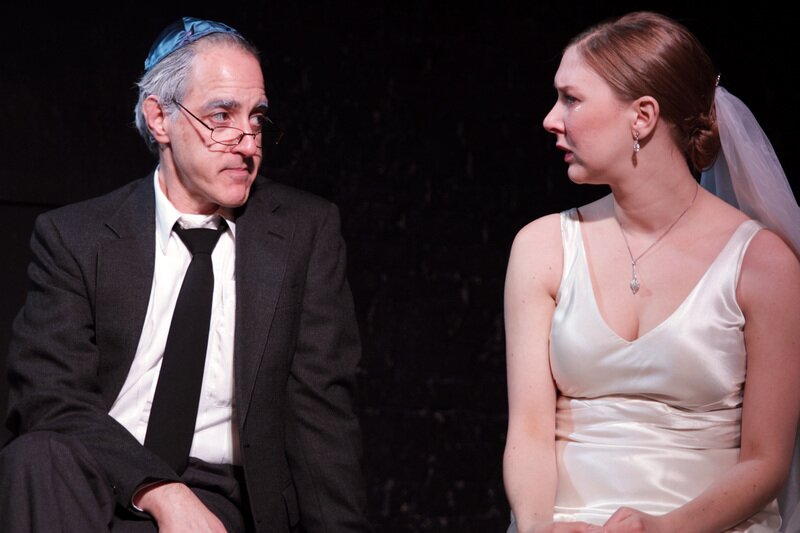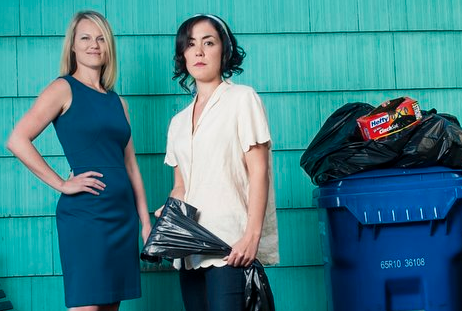
There’s a lot to love about the simplicity and wit of Holly Arsenault’s Undo (at Annex Theatre through Feb 16; tickets). In an alternate world — where in order to divorce someone in the eyes of God, you must first go back through your wedding ceremony in reverse — Undo creates an incredibly believable universe that would make weddings a lot more entertaining, you know, if you were into schadenfreude.
Written by Holly Arsenault, Undo looks at Rachel and Joe’s unraveling as they attempt to answer the questions of their un-wedding — should I get stoned (yes), will we be penalized by God for using a different florist (maybe), am I wearing the same underwear I was three years ago (thank god, no). Filled with utter sadness at times coupled with dry and dark humor, the unspecial day features secrets, confessions, and a truly awkward (bordering on disturbing) sex scene in wedding clothes.
Rachel and Joe’s family is full of genuine awkward splendor: a jovial father figure who was recently widowed (Mark Waldstein), a by-the-book teenager wearing an incredibly short dress from the previous wedding (Samantha Leeds), the maid-of-honor sister in a ridiculous hat (Jillian Vashro) with her Irish lesbian lover (Amy Hill), the estranged aunt who lives in France (Marty Mukhalian), and of course, an overbearing Jewish mother (Barbara Lindsay). And you know a drunk bro and gal for good measure (Nick Edwards and Zoey Cane Belyea).
Under the direction of Erin Kraft, the production is at its best in showing the small, quiet moments between families. Particularly of note is Mark Waldstein as the sage, non-judgmental father of Joe (Ashton Hyman), who radiates calm as everyone else starts falling apart. Sydney Andrews’ Rachel is quiet and seemingly battling the entire time with a fight or flight response while barely raising her voice, rendering a truly stunning performance. And Samantha Leeds as the little sister Naomi is positively heart-wrenching, keeping everything in order so her sister can make peace with God.
If there were a downside to the production, it is that father and son (Waldstein and Hyman) come out looking downright saintly in comparison to mother and daughter (Lindsay and Andrews), who both hold dark secrets that destroy marriages. While the men get to be forgiving and loving, the flaws of the women are presented as damnable. Though there is heart in their flaws, the contrast of it being men and women seemed to highlight an underlying message I doubt Arsenault intended.
This flaw aside, Undo is an evening of blissful anguish watching two people sever ties to each other completely — a funny, dark look at how relationships end and all that goes into undoing what’s done.

